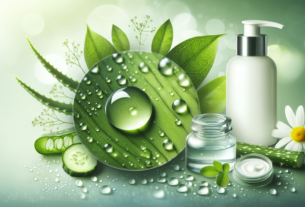Have you ever felt the frustration of dealing with irritated skin? It can be itchy, uncomfortable, and downright annoying. Whether it’s redness, dryness, or a sudden rash, skin irritation can disrupt your daily life. The good news is there are natural ways to soothe and pamper your irritated skin, helping it return to its smooth and calm state.

Understanding Skin Irritation
Before diving into remedies, let’s take a moment to understand what skin irritation is all about. Your skin is the largest organ of your body, acting as a barrier between you and the outside world. Sometimes, however, it can react to certain factors, leading to inflammation, redness, or itching.
Causes of Skin Irritation
Knowing the root causes of skin irritation is crucial for finding the right treatment. Here are some common culprits:
- Allergens: Allergic reactions to certain fabrics, cosmetics, or pollen can cause your skin to rebel.
- Environmental Factors: Changes in weather, pollution, or humidity can have an adverse effect.
- Personal Care Products: Certain soaps or lotions could contain harsh chemicals that upset your skin’s natural balance.
- Medical Conditions: Conditions such as eczema, psoriasis, or dermatitis might cause chronic irritation.
- Lifestyle Factors: Stress, diet, and lack of sleep play a significant role in skin health.
Symptoms to Watch For
Irritated skin can manifest in various ways. You might experience:
- Redness or swelling
- Itching or burning sensations
- Rough or flaky patches
- Blisters or bumps
Recognizing these symptoms early can help you address them more effectively.
Gentle Cleansing Techniques
The way you clean your skin can notably affect its health. Instead of using harsh soaps or hot water, opt for a gentler approach.
Choose the Right Cleanser
Selecting a cleanser that matches your skin type is vital. For instance, if you have dry skin, look for hydrating formulas. If you have sensitive skin, a fragrance-free and hypoallergenic product is your friend.
Proper Cleansing Steps
- Use Lukewarm Water: Hot water tends to strip away natural oils; instead, use lukewarm water to avoid further irritation.
- Be Gentle: Use your fingertips to apply the cleanser with light, circular motions. Avoid aggressive scrubbing, which may aggravate the skin.
- Rinse Thoroughly: Make sure to remove all traces of the cleanser.
- Pat Dry: Instead of rubbing, gently pat your skin dry with a soft towel.
Natural Moisturizing Methods
Your skin thrives on moisture. Keeping it well-hydrated can significantly relieve irritation.
Natural Oils for Moisture
Natural oils can work wonders for replenishing your skin’s moisture barrier. Here are some you might consider:
- Coconut Oil: Known for its anti-inflammatory properties, coconut oil can soothe and hydrate.
- Jojoba Oil: Resembling your skin’s natural sebum, jojoba oil is ideal for all skin types.
- Almond Oil: Rich in vitamins, almond oil softens and smooths the skin.
DIY Moisturizing Masks
Crafting a face mask using natural ingredients can be both soothing and rewarding. Try combining honey (a natural humectant) with yogurt (rich in lactic acid) for a mask that hydrates and gently exfoliates.
Cooling Remedies for Relief
If your skin feels inflamed or overheated, cooling remedies can provide much-needed comfort.
Aloe Vera Gel
Aloe vera is a superstar when it comes to soothing irritated skin. Apply a thin layer of 100% aloe gel and feel its cool relief. It’s particularly effective for sunburned skin.
Cucumber Slices
This crispy vegetable isn’t just for salads. Cucumber’s high water content and gentle astringent properties can refresh your skin. Place a few chilled slices over affected areas for a cooling effect.

Dietary Considerations for Healthy Skin
Your diet plays a substantial role in your skin’s health. Fueling your body with the right nutrients can enhance your skin’s ability to recover and maintain its balance.
Foods That Benefit the Skin
Incorporating these foods can aid in reducing skin inflammation:
- Fatty Fish: Salmon and mackerel are rich in omega-3 fatty acids, which reduce inflammation.
- Nuts and Seeds: Almonds, sunflower seeds, and walnuts contain vitamin E—a powerful antioxidant.
- Leafy Greens: Spinach and kale offer a wealth of vitamins and minerals crucial for skin repair.
Foods to Avoid
Cutting down on these might help in minimizing irritation:
- Processed Foods: Often high in sugar and unhealthy fats.
- Dairy Products: For some, dairy can trigger skin flare-ups.
- Spices: Hot spices might cause irritation for sensitive skin types.
Herbal Solutions
Herbs have been relied upon for centuries to treat a myriad of ailments, including skin irritation.
Chamomile
Chamomile is a gentle herb known for its calming effects. You can brew a chamomile tea and apply it directly to your skin with a soft cloth. Alternatively, look for creams containing chamomile extracts.
Tea Tree Oil

While you should never apply tea tree oil directly to the skin, this essential oil is known for its antimicrobial properties. Mixing a few drops with a carrier oil can help in soothing irritation.
Calendula
Widely used in skincare products, calendula is famed for its skin healing qualities. A dab of calendula ointment or cream can accelerate your skin’s recovery.
Stress Management Techniques
Stress is more than just a mental hurdle; it can affect your skin’s health too. Learning how to manage stress can benefit not only your psychological well-being but your complexion as well.
Regular Exercise
Exercise is a natural stress reducer that can also boost circulation, which helps keep your skin glowing and healthy.
Consistent Sleep Schedule
Your skin uses the time while you sleep to repair and rejuvenate. Ensuring a regular and ample sleep routine is a cornerstone for healthy skin.
When to Seek Professional Help
Sometimes, home remedies aren’t enough, and you might need to consult a dermatologist or healthcare expert.
Persistent Symptoms
If your irritation doesn’t improve after trying natural remedies for a few weeks, it may be time to seek professional advice.
Severe Reactions
In cases where the skin irritation is severe, such as with widespread rash or pain, you should consult a medical professional promptly.
Conclusion
Finding natural solutions to soothe irritated skin may take a little trial and error, but it’s a journey where your skin—and peace of mind—benefit in the end. By understanding your skin’s nature and treating it with gentle, loving care, you can help restore its natural balance. Approach this venture with patience, and allow your skin the grace to heal itself with a bit of aid from Mother Nature.



